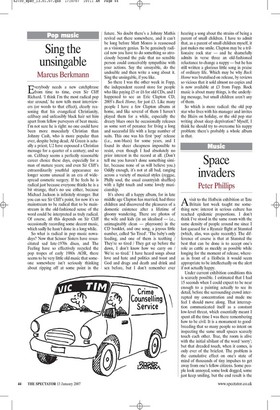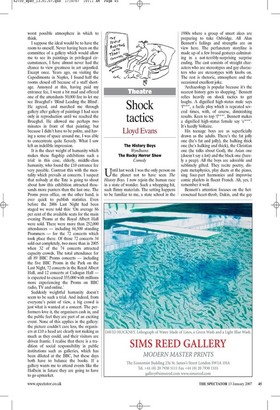Space invaders
Peter Phillips Avisit to the Holbein exhibition at Tate Britain last week taught me something new: interest in serious culture has reached epidemic proportions. I don't think I've stood in the same room with the same density of people around me since I last queued for a Ryanair flight at Stansted (which, alas, was quite recently). The difference of course is that at Stansted the best that can be done is to accept one's role as cattle as meekly as possible while longing for the moment of release, whereas in front of a Holbein it would seem appropriate to be intellectually on the alert if not actually happy.
Under current exhibition conditions this is scarcely possible. I estimated that I had 15 seconds when I could expect to be near enough to a painting actually to see its detail, before the surrounding crowd interrupted my concentration and made me feel I should move along. That interruption communicated itself as a constant low-level threat, which essentially meant I spent all the time I was there remembering how to be civil. It is a monument to goodbreeding that so many people so intent on inspecting the same small spaces scarcely touch each other. True, the room is alive with the initial sibilant of the word `sorry'; but that dreaded touch, when it comes, is only ever of the briefest. The problem is the cumulative effect on one's state of mind of thousands of tiny impulses to get away from one's fellow citizens. Some people look annoyed, some look dogged, some just keep smiling, but the end result is the worst possible atmosphere in which to think.
I suppose the ideal would be to have the room to oneself. Never having been on the committee of a gallery which would allow me to see its paintings in privileged circumstances, I have almost never had the chance to view greatness in art unjostled. Except once. Years ago, on visiting the Capodimonte in Naples, I found half the rooms closed off because of a staff shortage. Annoyed at this, having paid my entrance fee, I went a bit mad and offered one of the attendants 50,000 lire to let me see Brueghel's 'Blind Leading the Blind'. He agreed, and marched me through gallery after gallery of paintings I had seen only in reproduction until we reached the Brueghel. He allowed me perhaps two minutes in front of that painting; but because I didn't have to be polite, and having a sense of space around me, I was able to concentrate quite fiercely. What I saw left an indelible impression.
It is the sheer weight of humanity which makes these flagship exhibitions such a trial: in this case, elderly, middle-class humanity, who found the £10 entrance fee very payable. Contrast this with the mentality which prevails at concerts. I suspect that nobody at the Tate is going to shout about how this exhibition attracted thousands more punters than the last one. The Proms press office, on the other hand, is ever quick to publish statistics. Even before the 2006 Last Night had been staged we were told this: 'On average 86 per cent of the available seats for the main evening Proms at the Royal Albert Hall were sold. There were more than 252,000 attendances — including 66,500 standing Prommers — for the 72 concerts which took place there. Of those 72 concerts 34 sold out completely, two more than in 2005 when 32 of the 74 concerts attracted capacity crowds. The total attendance for all 89 BBC Proms concerts — including the five BBC Proms in the Park on the Last Night, 72 concerts in the Royal Albert Hall, and 12 concerts at Cadogan Hall — is expected to exceed 355,000 with millions more experiencing the Proms on BBC radio, TV and online.'
Suddenly weightful humanity doesn't seem to be such a trial. And indeed, from everyone's point of view, a big crowd is just what is wanted at a concert. The performers love it, the organisers cash in, and the public feel they are part of an exciting event. None of this applies in the gallery: the picture couldn't care less, the organisers at £10 a head are clearly not making as much as they could, and their visitors are driven frantic. I realise that there is a tradition of social responsibility in public institutions such as galleries, which has been diluted at the BBC, but these days both have to balance the books. If a gallery wants me to attend events like the Holbein in future they are going to have to go upmarket.























































 Previous page
Previous page